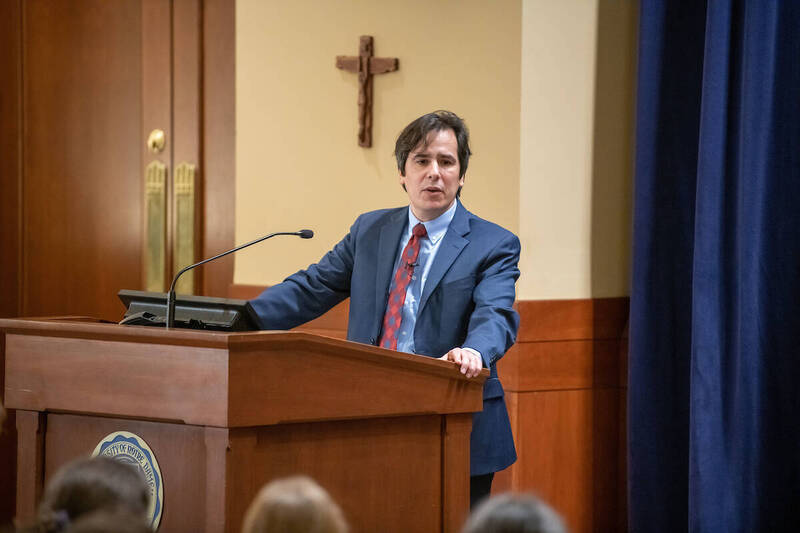 “No matter how carefully the politicians sanitize their experiences and their positions and their records, no matter how diligently they present themselves in the best and the safest and the most electable light, they almost always end up revealing themselves in these books.” Photo by Barbara Johnston
“No matter how carefully the politicians sanitize their experiences and their positions and their records, no matter how diligently they present themselves in the best and the safest and the most electable light, they almost always end up revealing themselves in these books.” Photo by Barbara Johnston

As a Pulitzer Prize-winning journalist, Carlos Lozada ’93 often gets a standard response to his reviews of books written by Washington insiders: “You read that book so we don’t have to.”
Lozada specializes in analyzing American government, culture and the nation’s leadership through what is written: books by the politicians themselves, tell-all tomes by former political aides, congressional investigation reports, Supreme Court decisions and other texts.
There’s an important reason to read those Washington books, Lozada said February 9 while delivering the 2023 Red Smith Lecture on campus: “No matter how carefully the politicians sanitize their experiences and their positions and their records, no matter how diligently they present themselves in the best and the safest and the most electable light, they almost always end up revealing themselves in these books. Whether they mean to or not, they tell us who they really are.”
In the books they write, politicians “tell on themselves,” Lozada said. “And when they tell on themselves, they often tell us something else about the state of our politics or the state of our civic life.”
Lozada is an Opinion columnist for The New York Times and author of a 2020 book, What Were We Thinking: A Brief Intellectual History of the Trump Era. While working as the nonfiction book critic for The Washington Post, he won the Pulitzer Prize for criticism in 2019. He received the 2015 National Book Critics Circle’s citation for excellence in reviewing.
A native of Peru, Lozada majored in economics and political science at Notre Dame, and later earned a master’s degree in public policy from Princeton University.
Following are selections from Lozada’s remarks.
On Barack Obama:
“His 1995 memoir, Dreams from My Father, is in my opinion a wonderfully written book. So much so that I think all his subsequent books kind of suffer in comparison.”
Reggie Love, an Obama aide, wrote a 2016 book, Power Forward: My Presidential Education, that included an anecdote about how he forgot to bring Obama’s briefcase on a flight to a primary debate, a major mistake for a political “body man” that Love feared would lead to his firing. Instead, Obama gave him a second chance.
Love wrote that Obama liked to be seen carrying his things onto planes, telling the aide that John F. Kennedy carried his own bags.
“That one little line: ‘JFK carried his own bags,’ is the only thing I will ever remember from reading Reggie Love’s memoir. It says so much about how carefully Obama cultivated his self-image and how he wanted people to think about him and his story.”
On reading the ghostwritten books of Donald Trump in 2015 after the businessman announced he was running for president:
In one book, Trump explained in detail that his hair was always neat because he didn’t have to deal with the elements. He rode an elevator from his condo to his office, and most of the rest of the time he was in his limousine, his jet or at his private club in Palm Beach.
“Judging from that passage, Donald Trump lived in the bubble of his own making long before he ever got to Washington,” Lozada said. “In those words, Trump reveals his complete and very deliberately constructed isolation. And it’s the kind of isolation that lets you spin and believe whatever story you create for yourself.”
On Hillary Clinton’s 1996 book, It Takes A Village, published before she served as a U.S. senator and Secretary of State:
“In this book, which is published right in the middle of her eight-year tenure as First Lady, you see two Hillary Clintons doing battle with each other. She combines very progressive tendencies on big social policy issues such as healthcare with surprisingly moderate or even conservative views on cultural and family issues.”
On former Vice President Mike Pence’s new book, So Help Me God, in which he quotes from Trump’s video address during the late afternoon of January 6, 2021, when the president finally called on the rioters to leave the U.S. Capitol. Pence places an ellipsis in the section of the quotation where Trump again described it as a “stolen” election:
“So much of Pence’s vice presidency is captured in those three little dots.”
“Mike Pence does not mention his boss, Donald Trump, in the acknowledgements of his White House memoir. I think that’s a little sign he’s trying to kind of show he’s his own man.”
On the U.S. Supreme Court’s 2022 Dobbs v. Jackson Women’s Health Organization ruling overturning Roe v. Wade and determining the U.S. Constitution doesn’t confer a right to abortion:
“Different factions of the court accuse each other of incompetence, of duplicity, of caucusing. The Dobbs majority opinion overturning Roe said that Roe had been an elaborate scheme concocted to make up a constitutional right. The dissenters denounce the majority for letting their personal politics get in the way of their duty. They say that with Dobbs, the court departs from its obligation to faithfully and impartially apply the law.
“Basically, the justices are all accusing each other of giving into insidious political impulses and pressures, while they alone remain uncorrupted.”
Lozada’s visit was hosted by the Gallivan Program in Journalism, Ethics and Democracy, the Notre Dame Institute for Advanced Study, and Notre Dame Magazine.
Margaret Fosmoe is an associate editor of this magazine. She can be reached at mfosmoe@nd.edu or @mfosmoe.